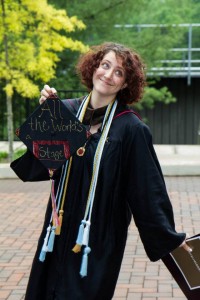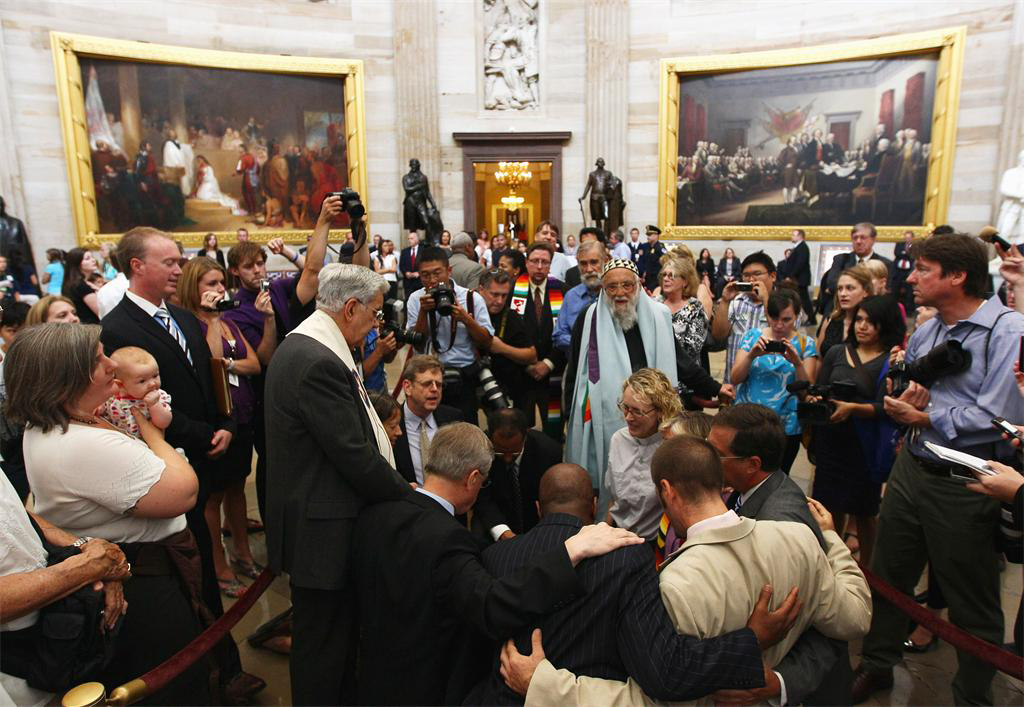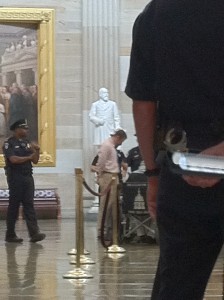I shared this reflection this morning as a part of the peacemaking reports at Annual Conference, and thought it would be appropriate to share it here, too.
Sisters and brothers, it is truly a honor and a privilege to have the opportunity to address you this morning. There has been an awful lot of referencing of past Annual Conference statements throughout the course of our time together – a practice I would very much like to affirm, and add my voice to. I want you to hear these words from our 1977 Statement, “Justice and Nonviolence”:
“We cannot retreat from the world. We are to move from where we are to where God’s power and purpose have begun to define new possibilities and new necessities. We must become aware of the rampant injustice and subtle hidden violence in today’s world, examine our own involvement, and identify non-violently with the oppressed and suffering.
We must develop a theology of living here and now in the spirit of the kingdom. We look toward a future that will be more peaceful, just, and respectful of God’s creation. We who are of the body of Christ, an incarnation of God’s reconciling and redeeming love in the world; are called to be a channel of God’s loving justice. Wherever brokenness among people exists, we are called to participate in God’s work of healing; wherever people suffer from oppression, we are to work for God’s act of liberation; and wherever people are deprived of basic human needs and opportunities we are called to God’s work of humanization. We are called to live the life of God’s agape in the world because Christ is our Lord.”
I start with these words because in my mind, they are the foundation of the work that comes out of the Peace Witness Ministry office in Washington, DC. Sisters and brothers, we have heard, particularly yesterday, of the witness that we as the Church of the Brethren bring to the ecumenical community on issues relating to peace – in the affirmation of our witness by the World Council of Churches in calling violence contrary to the will of God, in the National Council of Churches seeking our guidance on the issuance of a statement on the war in Afghanistan, and in Sister Ruth’s report in our deep input in the Decade to Overcome Violence.
But I also start with these words because they represent the challenge that the ecumenical community’s witness brings before us – a new challenge for us in how we approach the gospel of peace – a push and a challenge to not only witness against war and violence, but to better preach what we are for.Are we willing to hear not only the acceptance of our message of peace by the ecumenical community, but the challenge they bring to us in the midst of their acceptance? Are we ready to more actively seek a just peace – even when it might make us a bit uncomfortable? When it might challenge the standards and the reality that we have gotten used to?
We are indeed a historic peace church, and a living peace church. One that has effectively, and continually, provided a witness against war – both in general and in the specific. Often, this has taken the form of a witness of conscientious objection – standing before our fellow citizens and publically saying, no. We will not fight. It is not the way of Christ or the will of God. It has been a powerful witness to the world – especially as we have engaged in alternative forms of service, a practice that continues today.
But what I believe our 1977 statement, and the witness of the ecumenical community is pushing us toward is to reconsider what it means to be a conscientious objector to war and violence, publically, in our world today. What does it really mean to be a living, breathing, just peace church? I think we see this in the 4 areas that the International Ecumenical Peace Convocation addressed. Peace in the community, peace with the earth, peace with the marketplace, and peace among the peoples. This is also why our presence in Washington, DC, is called Peace Witness Ministry.
Because, sisters and brothers, when we speak on issues pertaining to justice, we are being conscientious objectors to the violence in our world today, and doing the work of peace. When we engage in the federal budget conversation currently going on, as we did recently in a letter that read, in part, “The unprecedented and dangerous cuts to discretionary domestic programs and poverty-focused foreign assistance will jeopardize the lives and well-being of millions now and into the future. These deep and unwise spending cuts are a betrayal of our call to love our neighbor. Our faith points our nation to “a more excellent way” (1 Cor. 12:31) that bears one another’s burdens, acknowledges our interdependence, and compels sacrifice and love for our neighbors in need. We therefore urge you to reject proposed cuts that would undermine domestic and international efforts to help those who are struggling to overcome poverty”, we are conscientiously speaking words of peace in the community and the marketplace.
When we address issues relating to crises in Creation – such as the oil spill in the Gulf of Mexico, as we did in a letter that read in part, “Communities of faith will continue to work to fulfill the commitment we made following Katrina: to stand with others for the common good, to engage in acts of philanthropic justice and loving kindness, and to embody the belief that we share a responsibility for ensuring we leave our nation and our world better for our children. We urge you to follow through on your commitment to the Gulf Coast by doing all you can to guarantee that the oil spill response effort is comprehensive, effective, and just, meeting the needs of those suffering today while laying a foundation for long-term restoration and renewal”, we are speaking words of peace to the entirety of Creation.
When we speak out on issues relating to the Middle East, as we did in both a visit to the White House, and a letter to the Obama Administration that read, “Like Jesus’ parable about the persistent widow who kept on demanding justice over and again until justice was received (Luke 18:1-8), we hope that you will keep insisting over and again that all parties keep up the hard work of reconciliation until a just and lasting peace is achieved”, we are speaking words of peace among the peoples.
However, this is not just a challenge for our broad, public statements as a denomination to members of Congress or the Administration. Both myself and Brother Stan have taken meetings with Members of Congress and the Administration, and signed letters on behalf of the Church of the Brethren. However, those words, meetings, and letters bear only as much weight as our collective body is willing to put behind it. To be frank, no member of Congress cares what I have to say when I step into their office unless you are also willing to contact them. Sisters and brothers, this is the challenge that is before us as we consider what it means to be a body that actively seeks to publically live peace in our world today. Are we willing to take stands together against violence as it is perpetuated around us?
Are we willing to speak out against the systems of economic violence that keep so many embroiled in a reality of hunger and poverty – even when it may challenge the relative comfort in which so many of us live? Are we willing to speak out against the systems of environmental violence that are wreaking havoc on God’s people and God’s Creation around the world – even if it might mean life might be a bit less convenient for all of us? I pray that we are. It is why the largest part of what Peace Witness Ministries is is not about doing ministry on your behalf – but by entering into the ministry of peace witness with you. It is why an action alert is sent out every week – encouraging you to speak to your government the vision of peace that God has for this world. It is why fact sheets, worship resources, and, well, myself (I do love to get out of DC) are being made available to make considering a new way of being a conscientious objector is integral to the life of you as a Christian and your church. And it is why opportunities to come to DC and provide personal witness are consistently being promoted.
I want to close with more words from the 1977 paper:
“Our understanding of the mind of Christ demands of us vigorous non-violent involvement and identification with the poor and the oppressed, all the while acknowledging our limitation and confessing our complicity in the evils addressed. We also recognize that these problems (evils) are massive, complex, and ambiguous and that we lack perfect knowledge. We believe, however, that Christian discipleship demands decision and action to help achieve greater justice and peace in our time.
We must face the risks and vigorously implement the love of God in our political, economic, and social relations. The consequences of our decisions and actions may be as costly as when Jesus was accused of political subversion and was executed. We need faith, moral courage, and love as revealed in Jesus Christ and lived out in the faith community.
Our own faith community cannot escape its responsibility to act for justice, liberation, and peace. It is imperative for us as a church to pursue further biblical and theological reflection and study about the meaning of God’s justice for concrete action in our homes, churches, communities, and nation. Brethren ought to assume leadership in their communities to bring concerned persons together from other churches and secular agencies for study, action, and reflection around these concerns. District boards and executives should lift up the vision and develop projects for both district and local programs. Placement of leadership should be influenced by criteria related to the commitment of candidates to justice, liberation, and peace. In order to help generate wider support for needed change in systems we should use all available communications media to expose problems, raise awareness, and suggest transforming action.”
It is my hope, and my prayer, that you will join the Peace Witness Ministry Office in this work, and with each step of conscience we take together, that we may bring God’s vision for this world into slightly better focus. Thank you, sisters and brothers.
 Ever since I attended college, I knew that afterwards I would volunteer. I spent so much of my life thinking about “me” and what “I” would do. I was sick of this lifestyle that only focused on me. I knew I needed to do more to make others happy. What better way to do this than to volunteer? I didn’t have to look far for a way to do this because I grew up in the Church of the Brethren and have known about Brethren Volunteer Service (or BVS) for the majority of my life. I really grew interested in it by attending Bridgewater College and hearing about it from representatives and recruiters that I encountered at least twice a year from Roundtable (an annual conference for youth of which I was part of planning) and other random events. I applied for BVS over-achiever style in the early months of my final semester. After waiting many months to finish up college, it was FINALLY time to attend BVS orientation!
Ever since I attended college, I knew that afterwards I would volunteer. I spent so much of my life thinking about “me” and what “I” would do. I was sick of this lifestyle that only focused on me. I knew I needed to do more to make others happy. What better way to do this than to volunteer? I didn’t have to look far for a way to do this because I grew up in the Church of the Brethren and have known about Brethren Volunteer Service (or BVS) for the majority of my life. I really grew interested in it by attending Bridgewater College and hearing about it from representatives and recruiters that I encountered at least twice a year from Roundtable (an annual conference for youth of which I was part of planning) and other random events. I applied for BVS over-achiever style in the early months of my final semester. After waiting many months to finish up college, it was FINALLY time to attend BVS orientation!


 6.
6. 


